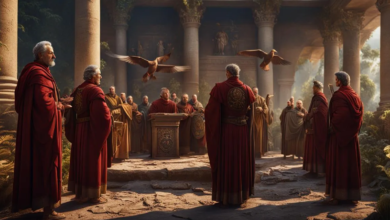Roman mythology is a rich and intricate tapestry of stories and beliefs that have been passed down through generations. The origins of Roman mythology can be traced back to the ancient city of Rome, where it played a crucial role in shaping the culture and beliefs of the Roman people.
One of the key influences on Roman mythology was the mythology of the Greeks. The Romans were heavily influenced by Greek culture and religion, and many of their myths and gods were borrowed directly from the Greek pantheon. For example, the major Roman gods Jupiter, Juno, and Neptune can be directly traced back to their Greek counterparts Zeus, Hera, and Poseidon.
However, the Romans also had their own unique myths and deities that were specific to their culture. One of the key differences between Roman and Greek mythology is the emphasis on practicality and pragmatism in Roman beliefs. The Roman gods were often portrayed as embodying virtues such as duty, honor, and piety, reflecting the values of Roman society.
The origins of Roman mythology can be traced back to the founding of Rome itself. According to legend, Rome was founded in 753 BC by Romulus and Remus, twin brothers who were raised by a she-wolf. The story of Romulus and Remus is central to Roman mythology, and the city of Rome was seen as a divine creation ordained by the gods.
The Roman pantheon consisted of a diverse array of gods and goddesses, each with their own attributes and powers. Some of the major Roman gods included Jupiter, the king of the gods and god of lightning and thunder; Juno, the queen of the gods and goddess of marriage and childbirth; and Mars, the god of war.
In addition to the major gods, the Romans also worshipped a multitude of minor deities who were associated with specific aspects of daily life. For example, Vesta was the goddess of the hearth and home, while Bacchus was the god of wine and revelry. These minor deities played an important role in Roman religious practices and rituals.
One of the most significant aspects of Roman mythology was the concept of the numina, or divine forces that inhabited the natural world. The Romans believed that every aspect of nature was imbued with a divine spirit, from the trees and rivers to the mountains and fields. These numina were worshipped through rituals and sacrifices, and were seen as benevolent or malevolent depending on how they were appeased.
Another important aspect of Roman mythology was the belief in fate and destiny. The Romans believed that the course of human life was determined by the gods, and that individuals were bound by the dictates of fate. This belief in fate was reflected in the myths and legends of Rome, where heroes and heroines often faced insurmountable odds and were ultimately powerless to change their destinies.
One of the most famous myths in Roman mythology is the story of Aeneas, a Trojan hero who escaped the fall of Troy and journeyed to Italy to found the city of Rome. The story of Aeneas was immortalized in Virgil’s epic poem, the Aeneid, which presented Aeneas as a paragon of Roman virtue and piety. The Aeneid played a crucial role in shaping Roman identity and beliefs, and remains one of the most important works of Roman literature.
In addition to epic poems like the Aeneid, Roman mythology was also preserved in a variety of other sources, including plays, artwork, and inscriptions. These sources provide valuable insights into the beliefs and practices of the Romans, and help us to understand the role that mythology played in shaping Roman society.
As Rome expanded its empire and came into contact with other cultures, its mythology evolved and assimilated new deities and beliefs. The Romans often equated foreign gods with their own, creating a rich tapestry of gods and goddesses from diverse cultures. This syncretism was a hallmark of Roman religious practice, and helped to solidify the unity of the empire.
Ultimately, the origins of Roman mythology are a complex and multifaceted tapestry of beliefs and traditions that have been passed down through generations. From the legendary founding of Rome by Romulus and Remus, to the epic tales of heroes like Aeneas, Roman mythology reflects the values and ideals of Roman society. Though many of its myths were borrowed from the Greeks, Roman mythology is a unique and vibrant tradition that continues to captivate and inspire us today.






